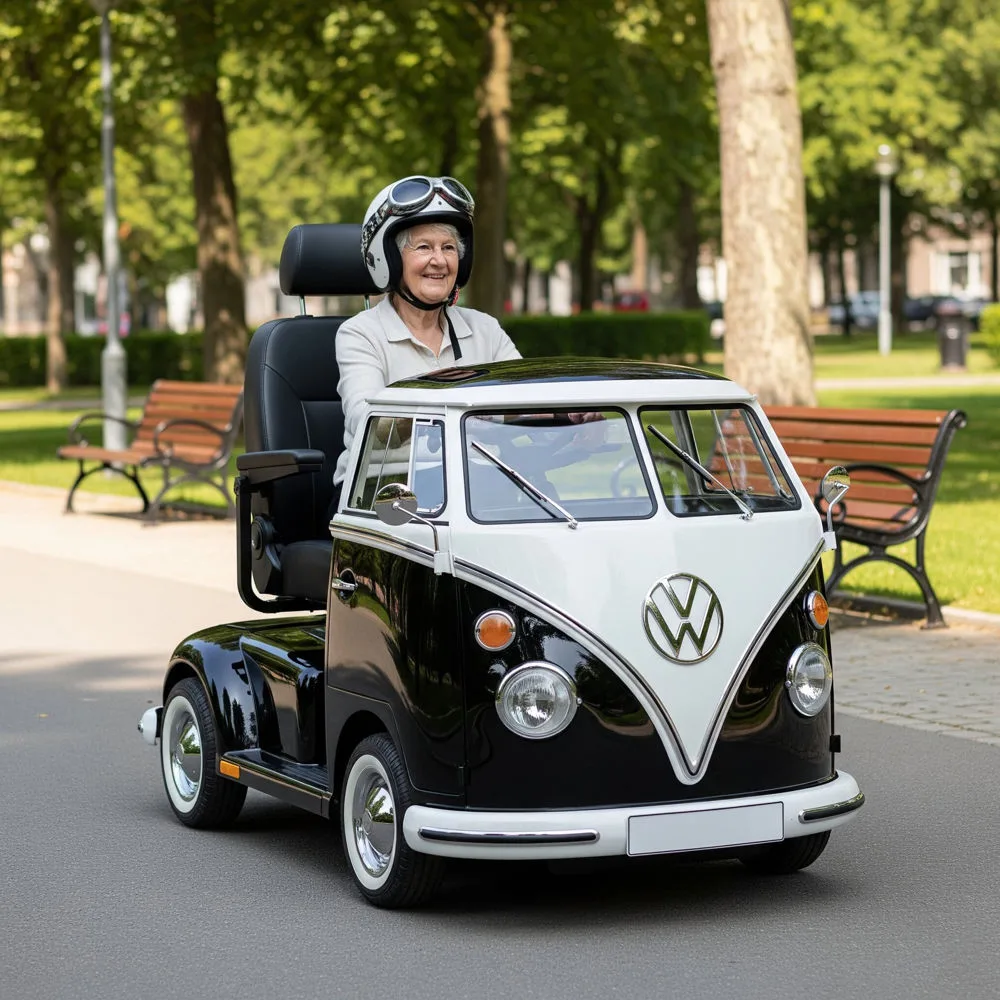For generations, the Volkswagen Bus has represented freedom, adventure, and the open road. Its iconic silhouette instantly evokes memories of road trips, camping adventures, and the carefree spirit of the 1960s and 70s. Today, that same beloved design has found a new purpose in an unexpected realm: mobility assistance devices.
The Volkswagen Bus Mobility Scooter represents a creative fusion of nostalgic design and practical modern technology, offering seniors and individuals with mobility challenges a way to maintain their independence while expressing their personality and style. In this comprehensive guide, we’ll explore how these innovative devices are changing perceptions around mobility aids and why they’re becoming increasingly popular among baby boomers and beyond.
The Evolution of Mobility Scooters: From Medical Necessity to Style Statement
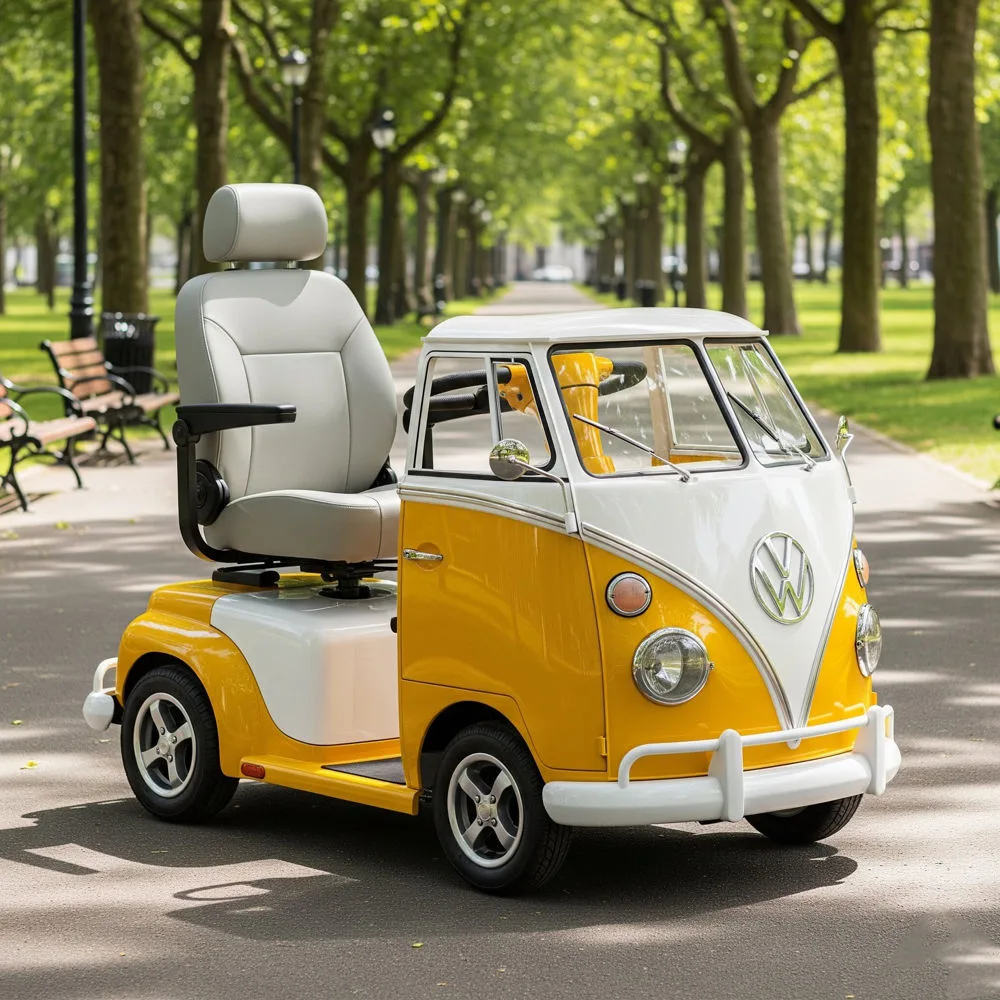
Traditional Mobility Scooters: Function Over Form
Historically, mobility scooters were designed with a singular focus on functionality. Their clinical, medical appearance often made users feel self-conscious, highlighting disability rather than enabling independence. These traditional models, while practical, frequently lacked personality and aesthetic appeal.
For many seniors and individuals with mobility challenges, the decision to begin using a mobility aid came with mixed emotions—relief at regained independence coupled with concerns about perception and identity. The sterile, hospital-like appearance of conventional scooters sometimes deterred potential users who might have benefited greatly from their assistance.
The Shift Toward Stylish Mobility Solutions
Recent years have witnessed a significant shift in mobility scooter design philosophy. Manufacturers began recognizing that users desire both functionality and personal expression. This realization sparked a wave of innovation in the industry, with designers increasingly incorporating elements of style, color, and personality into mobility aids.
This evolution reflects a broader cultural shift toward celebrating individuality at every life stage. Today’s seniors—many of whom came of age during the cultural revolution of the 1960s—maintain a strong sense of personal identity and refuse to let mobility challenges define their self-image.
The Volkswagen Bus Mobility Scooter: A Nostalgic Revolution
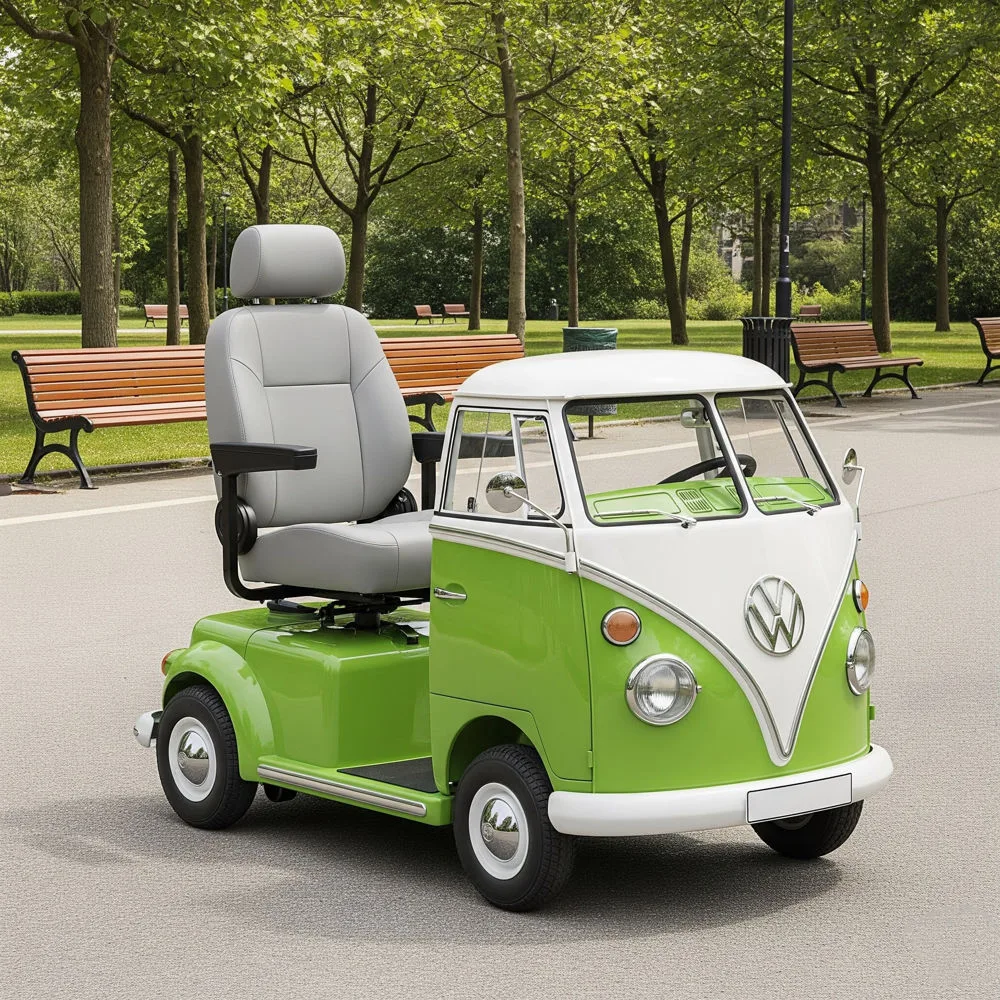
Design Elements That Capture the VW Magic
The Volkswagen Bus Mobility Scooter stands at the forefront of this design revolution. These scooters incorporate unmistakable elements of the classic VW Bus, including:
- The iconic split windshield front design
- Two-tone paint jobs reminiscent of vintage Volkswagen colorways
- Round headlights and distinctive VW emblems
- Chrome accents mimicking the original bus trim
- Comfortable seating with retro-inspired upholstery patterns
These thoughtful design elements transform what could be a purely utilitarian device into a conversation piece and personal statement. The attention to detail often extends to customizable features, allowing owners to select color combinations that match their personal memories of the original VW buses.
Technical Specifications and Modern Features
While the Volkswagen Bus Mobility Scooter draws heavily from retro aesthetics, its engineering is thoroughly modern. These scooters typically offer:
- Battery ranges of 15-25 miles on a single charge
- Top speeds between 4-8 mph for safe operation
- LED lighting systems for visibility and safety
- Adjustable seating for personalized comfort
- Digital displays showing battery life, speed, and distance traveled
- USB charging ports for mobile devices
- Lightweight yet durable frames for ease of transport
- Enhanced suspension systems for a comfortable ride
This combination of nostalgic design and cutting-edge mobility technology means users don’t have to sacrifice functionality for style or vice versa.
Target Audience: Who’s Driving These Retro Rides?
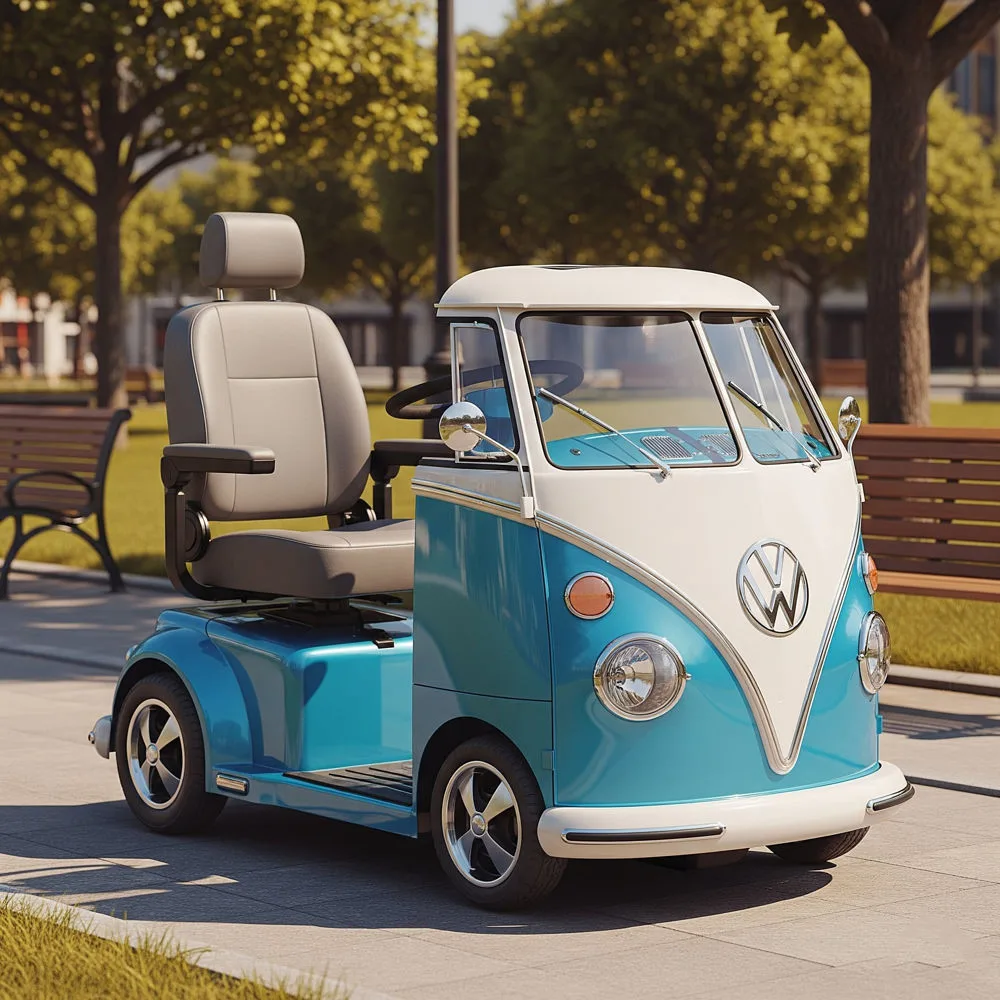
Baby Boomers: Reconnecting with Youth
The primary market for Volkswagen Bus Mobility Scooters is the baby boomer generation—those born between 1946 and 1964. Many in this demographic have personal connections to the original VW Bus, either having owned one in their youth or associating it with formative experiences during their young adult years.
For these individuals, choosing a VW Bus-styled mobility scooter represents more than a practical decision; it’s an emotional connection to their younger days and the values of freedom and individuality that the original vehicle represented. The psychological benefit of using a mobility aid that sparks joy and positive memories cannot be overstated.
Younger Generations with Mobility Needs
While baby boomers make up the largest user group, younger individuals with mobility challenges are increasingly drawn to these stylish alternatives to traditional scooters. For this demographic, the appeal often lies in the distinctive aesthetic and the opportunity to express personality rather than specifically in the nostalgia factor.
The retro design appeals to vintage enthusiasts across age groups, making these scooters popular with anyone who appreciates distinctive design and wishes to maintain their personal style while addressing mobility needs.
Benefits Beyond Mobility: The Psychological Impact of Stylish Mobility Aids
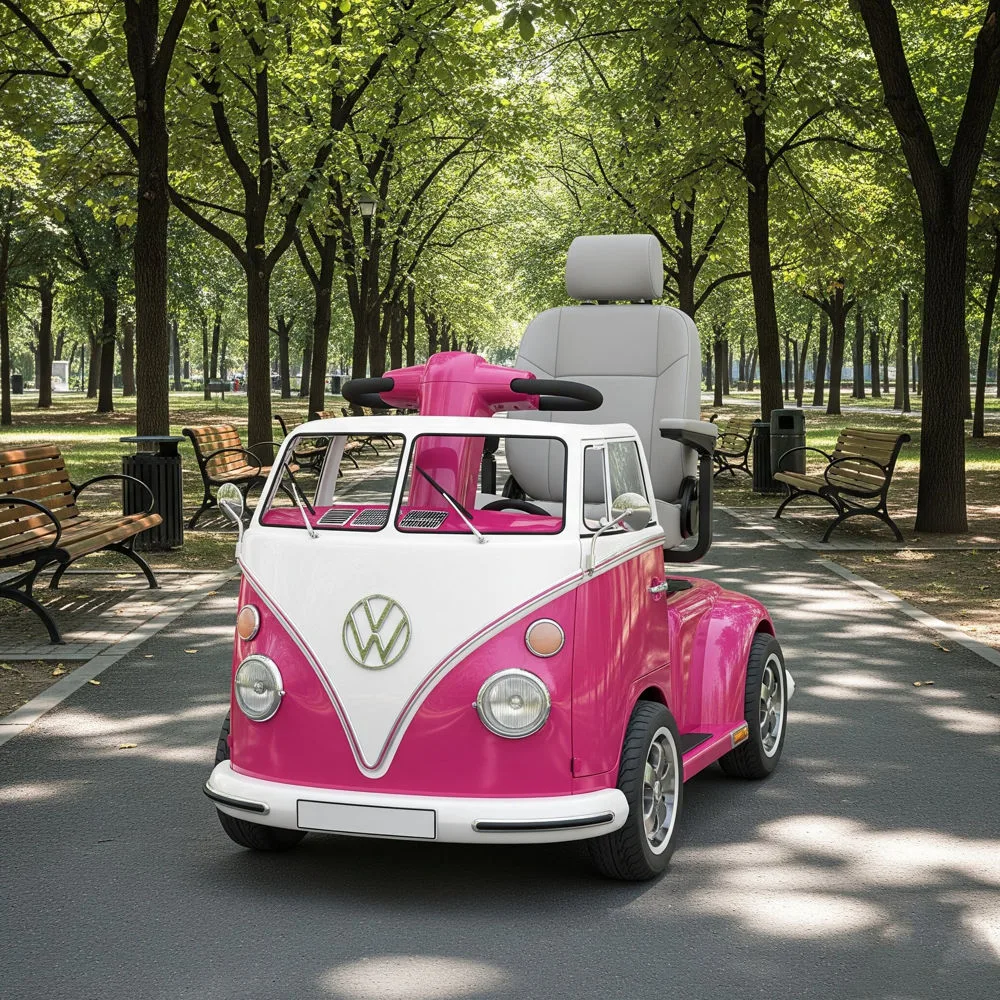
Reducing Stigma Around Mobility Assistance
One of the most significant benefits of the Volkswagen Bus Mobility Scooter is its role in reducing stigma around mobility aids. Traditional mobility scooters can sometimes draw unwanted attention that emphasizes disability. In contrast, these stylish alternatives often elicit positive reactions and serve as conversation starters about design rather than disability.
Many users report that their VW Bus scooter transforms potentially awkward social interactions into positive exchanges, with people approaching to admire the design rather than express sympathy for mobility challenges. This shift in social dynamics can significantly impact the user’s psychological well-being and willingness to engage in public activities.
Enhancing Quality of Life Through Design Psychology
Research in design psychology suggests that our surroundings and the objects we interact with daily significantly impact our mood and self-perception. Mobility aids with positive associations can transform the user experience from one of reluctant necessity to enthusiastic adoption.
Users of Volkswagen Bus Mobility Scooters frequently report:
- Greater willingness to use their mobility aid regularly
- Increased confidence in public settings
- Stronger sense of personal identity maintenance
- Higher overall satisfaction with their mobility solution
- More frequent social engagement and community participation
These psychological benefits translate into measurable improvements in physical health, as users are more likely to remain active and engaged when they feel positive about their mobility aids.
Purchasing Considerations: What to Know Before You Buy
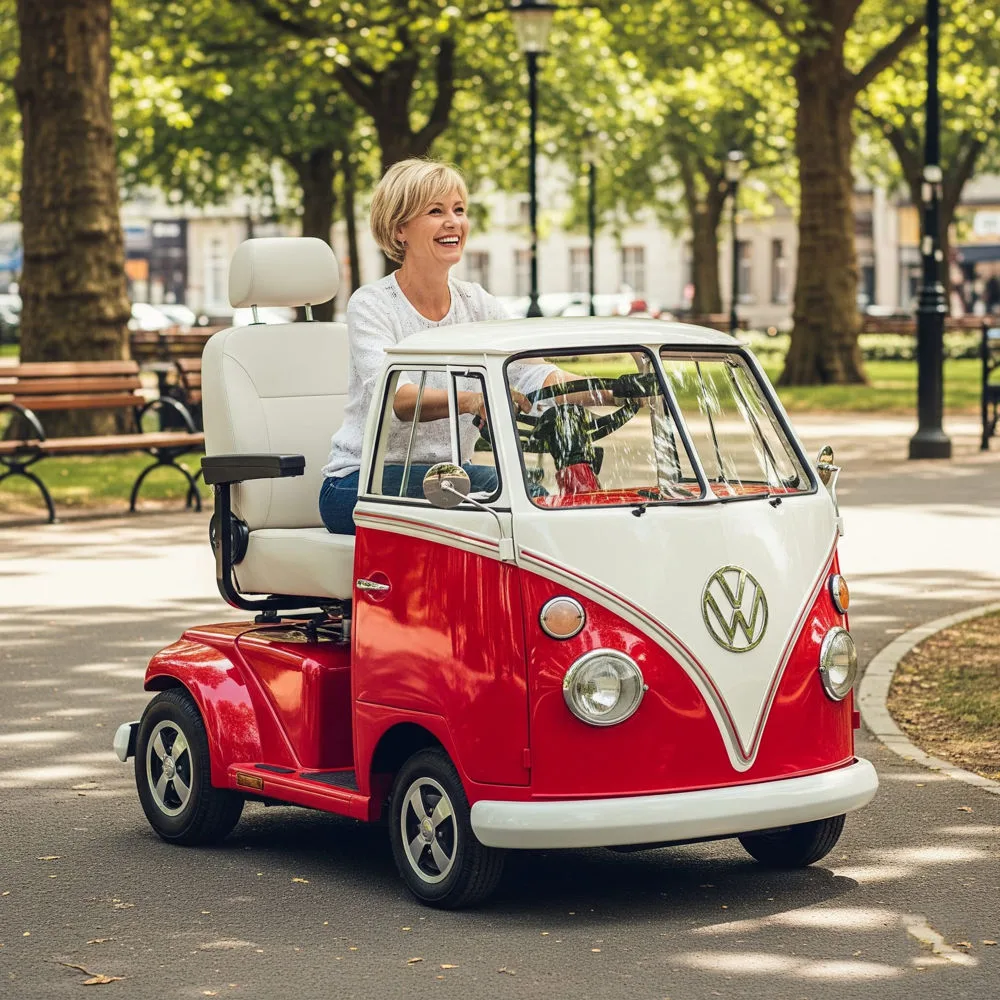
Price Points and Investment Value
Volkswagen Bus Mobility Scooters represent a premium segment of the mobility aid market. Prices typically range from $2,000 to $5,000 depending on features, customization options, and technical specifications. While this represents a significant investment compared to basic mobility scooters, many users find the additional cost justified by the enhanced experience and psychological benefits.
Many manufacturers offer financing options, and in some cases, insurance or Medicare may cover a portion of the cost if the scooter is deemed medically necessary. Potential buyers should investigate these possibilities before making a purchase decision.
Practical Considerations and Limitations
Despite their appeal, there are practical factors to consider when evaluating a Volkswagen Bus Mobility Scooter:
- Size and storage requirements may exceed those of more compact mobility aids
- Weight and transportability can be challenging for some users
- Battery life and charging requirements deserve careful consideration
- Indoor maneuverability may be limited in tight spaces
- Maintenance requirements and parts availability vary by manufacturer
Prospective buyers should evaluate these factors against their specific mobility needs and living situation.
Maintenance and Care: Keeping Your VW Bus Scooter on the Road
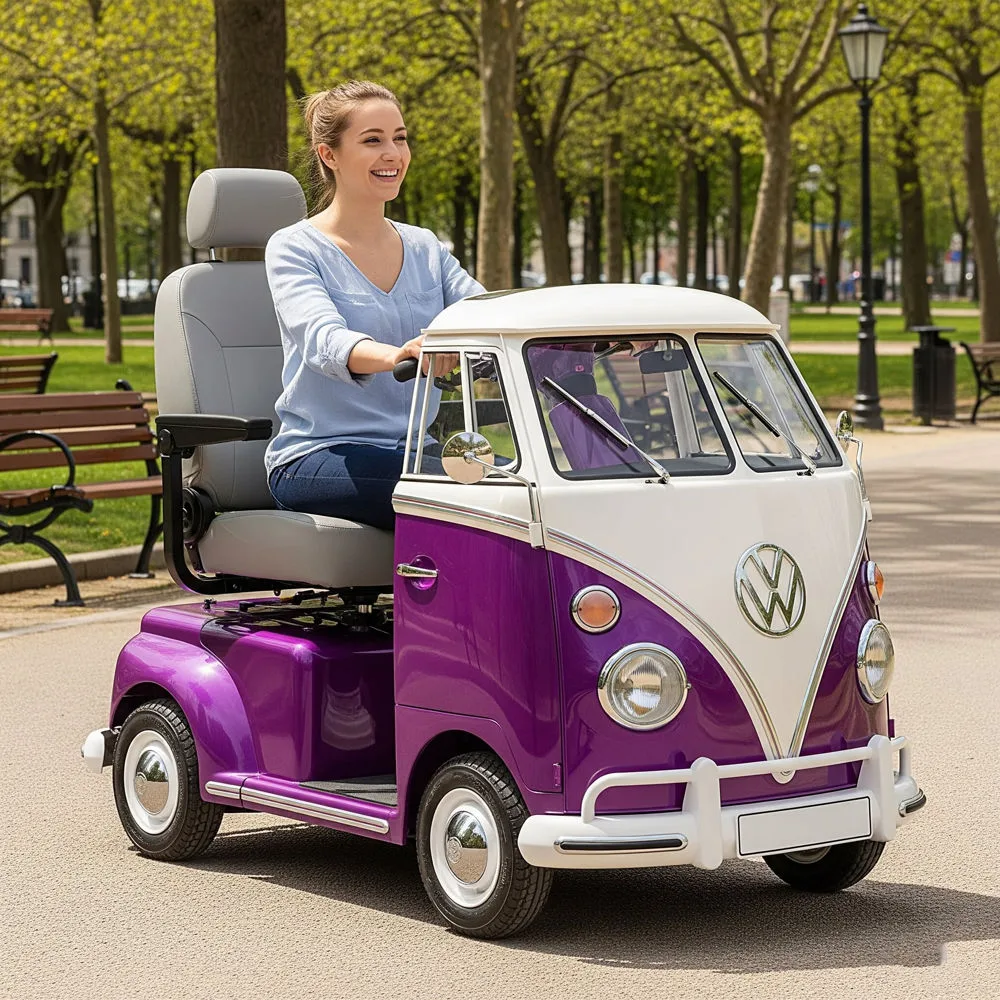
Battery Maintenance and Longevity
Like all electric mobility scooters, the Volkswagen Bus models require proper battery care for optimal performance and longevity. Most models use lithium-ion battery technology, which offers advantages in weight and charge cycles but requires specific maintenance protocols:
- Regular charging schedules even during periods of non-use
- Protection from extreme temperatures
- Proper storage procedures for extended periods of non-use
- Adherence to manufacturer-specific charging guidelines
With proper care, batteries typically last 2-3 years before requiring replacement, representing an ongoing maintenance cost to consider.
Aesthetic Care for Lasting Appeal
The distinctive appearance of a Volkswagen Bus Mobility Scooter is a major part of its appeal, making aesthetic maintenance important for many users. Regular cleaning of painted surfaces, chrome elements, and upholstery helps preserve the scooter’s visual impact and prevent premature aging of finishes.
Some owners join communities of like-minded enthusiasts who share maintenance tips and even organize “show and shine” events to display their customized mobility scooters, creating social opportunities around what might otherwise be seen as simply medical equipment.
The Future of Stylish Mobility: What’s Next?
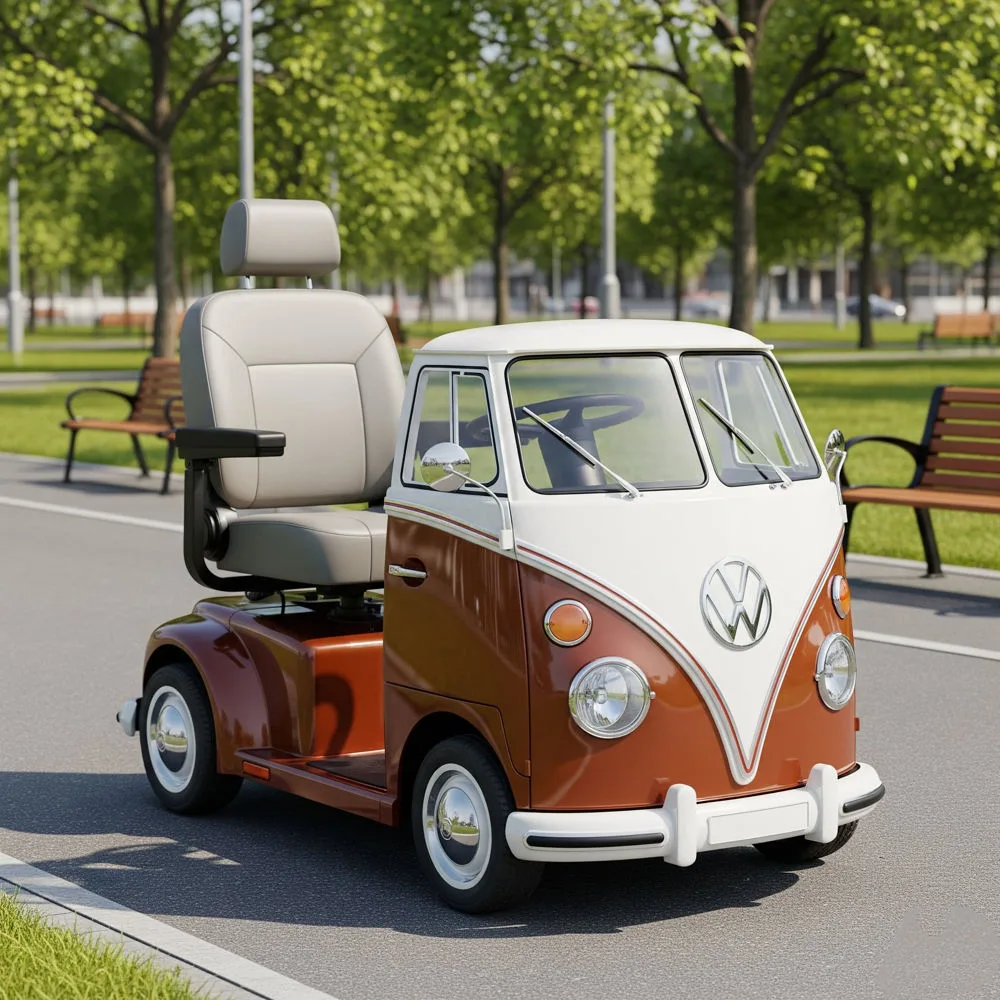
Expanding Design Options Beyond Volkswagen
The success of Volkswagen Bus-inspired mobility scooters has opened the door for other nostalgic and style-focused designs. Manufacturers are beginning to explore additional iconic vehicle inspirations, from classic American cars to British and European designs with strong cultural associations.
This trend suggests a future where mobility aids increasingly reflect personal style and interests rather than conforming to clinical, utilitarian aesthetics. The potential for growth in this sector remains significant as the aging population seeks mobility solutions that support their identity as well as their physical needs.
Technological Advancements on the Horizon
Beyond aesthetic innovations, technological advancements continue to enhance the functionality of premium mobility scooters:
- Smart connectivity features allowing remote monitoring and control
- Enhanced battery technology extending range and reducing charging time
- Lightweight materials improving portability without sacrificing durability
- Advanced suspension systems for improved comfort on varied terrain
- Integration with smart home technologies for seamless transitions
These technological improvements, combined with compelling design, position Volkswagen Bus Mobility Scooters and similar style-forward options at the cutting edge of the industry.
Why the Volkswagen Bus Mobility Scooter Represents More Than Transportation
The Volkswagen Bus Mobility Scooter exemplifies a fundamental shift in how we approach assistive technology. By blending iconic design with practical functionality, these devices challenge outdated perceptions of mobility aids as strictly medical equipment and instead position them as lifestyle choices that express personality and history.
For users, the benefits extend far beyond physical mobility to encompass psychological well-being, social engagement, and personal expression. The willingness to embrace mobility assistance increases dramatically when the aids themselves bring joy and positive associations rather than emphasizing limitation or disability.
As our population ages, the demand for mobility solutions that respect individuality and support positive self-image will only grow. The Volkswagen Bus Mobility Scooter represents an early answer to this demand—a nostalgic nod to the past that simultaneously paves the way for a more inclusive, design-conscious approach to mobility in the future.
Whether you’re considering such a scooter for yourself or a loved one, the blend of iconic style and modern functionality offers compelling advantages worth exploring. After all, if maintaining mobility is the journey, why not travel it in a vehicle that makes you smile?

